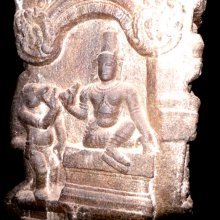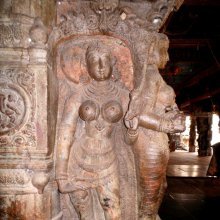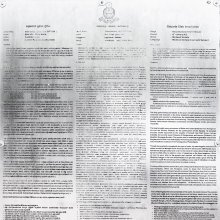Proof: 1 definition
Introduction:
Proof means something in Hinduism, Sanskrit. If you want to know the exact meaning, history, etymology or English translation of this term then check out the descriptions on this page. Add your comment or reference to a book if you want to contribute to this summary article.
Images (photo gallery)
In Hinduism
Yoga (school of philosophy)
Source: ORA: Amanaska (king of all yogas): A Critical Edition and Annotated Translation by Jason BirchA Proof (of existence) is denoted by the Sanskrit term Hetu, according to the Sarvajñānottara verse 20.34-39.—Accordingly, while discussing the culmination of detachment (for the process of attaining the no-mind state): “[...] Having made the mind supportless, he constantly meditates on the inconceivable. Know that the ultimate, incomparable bliss is that bliss, free of thought, inconceivable, transcending anything that might prove (hetu) or exemplify [its existence], which he experiences when his self has transcended [all] the Tattvas and has become devoid of [all] aspects”.

Yoga is originally considered a branch of Hindu philosophy (astika), but both ancient and modern Yoga combine the physical, mental and spiritual. Yoga teaches various physical techniques also known as āsanas (postures), used for various purposes (eg., meditation, contemplation, relaxation).
See also (Relevant definitions)
Ends with: Instant proof.
Full-text (+321): Pramanya, Pramana, Apramanya, Upapatti, Shabdapramana, Svatvabodhana, Pramanabhava, Pratyakshapramana, Purvapara, Pramanatas, Sadhyasiddhi, Sadhaka, Pramiti, Sapramana, Gamaka, Apramana, Pramanantara, Nirnetritva, Pramatri, Svatahpramana.
Relevant text
Search found 248 books and stories containing Proof; (plurals include: Prooves). You can also click to the full overview containing English textual excerpts. Below are direct links for the most relevant articles:
The Tattvasangraha [with commentary] (by Ganganatha Jha)
Verse 120 < [Chapter 4 - The doctrine of the ‘Thing by Itself’]
Verse 3310-3311 < [Chapter 26 - Examination of the ‘Person of Super-normal Vision’]
Verse 3307 < [Chapter 26 - Examination of the ‘Person of Super-normal Vision’]
Brahma Sutras (Nimbarka commentary) (by Roma Bose)
Brahma-Sūtra 4.2.9 < [Adhikaraṇa 5 - Sūtras 7-13]
Brahma-Sūtra 1.1.3 < [Adhikaraṇa 3 - Sūtra 3]
Brahma-Sūtra 1.1.4 < [Adhikaraṇa 4 - Sūtra 4]
Vaisheshika-sutra with Commentary (by Nandalal Sinha)
Sūtra 3.1.7 (Fallacious mark) < [Chapter 1 - Of the Marks of Inference]
Sūtra 7.1.21 (Proof of true Minuteness and true Shortness) < [Chapter 1 - Of Colour, Taste, Smell, and Touch, and Magnitude]
Sūtra 2.2.20 (Above continued) < [Chapter 2 - Of the Five Bhūtas, Time, and Space]
Padarthadharmasamgraha and Nyayakandali (by Ganganatha Jha)
Text 93 < [Chapter 6a - On Qualities]
Text 41: On Ākāśa < [Chapter 5 - Of the Mahābhūtas (Ultimate Material Substances)]
Text 158 < [Chapter 9 - On Samavāya (Inherence)]
Parables of Rama (by Swami Rama Tirtha)
Story 161 - Majority no Proof of Truth < [Chapter XXV - Truth]
Story 141 - The Secret of Success < [Chapter XXII - Success]
Story 120 - Reality Concealed < [Chapter XVI - Self Realization]
Mimamsa interpretation of Vedic Injunctions (Vidhi) (by Shreebas Debnath)
Related products
(+8 more products available)









